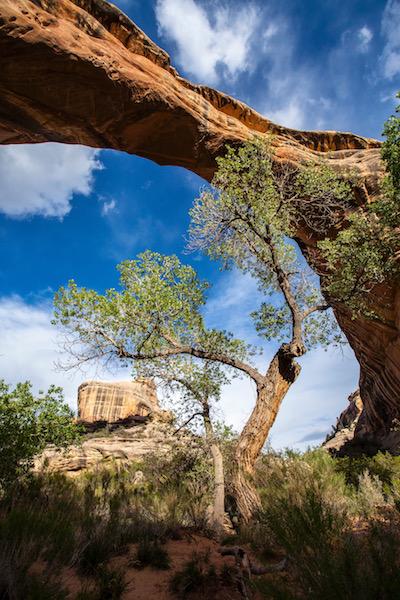
The cost to enter Natural Bridges National Monument is creeping up a bit/NPS, Jacob Frank
Higher fees, possible new units to the National Park System, and talk of reviving the Bluffs Restaurant along the Blue Ridge Parkway are just some of the matters around the National Park System that caught our eye this week.
Higher Fees At Natural Bridges, Hovenweep
In southern Utah, the entrance and campground fees at Natural Bridges National Monument and camping fees at Hovenweep National Monument will increase on April 1. At Natural Bridges, entrance fees will jump slightly from $10 per carload to $15, from $5 to $7 for folks either hiking or pedaling into the monument, and from $5 to $10 for motorcycles.
Entrance fees will return to Hovenweep later this year and match those at Natural Bridges.
Visitation to Hovenweep has increased almost 60% from 2014 when the decision was made that entrance fees collected were not sufficient to cover the cost of collecting those fees. A new analysis was completed that showed anticipated revenue resulting from the increased visitation would now be sufficient to collect fees. These fees will provide funds for deferred maintenance and visitor service projects.
Camping fees at both monuments also will go up as of April 1, from $10 to $15 between March 1 and October 31 (senior fees will go from $5 to $7 during those months). Between November 1 and February 28, camping fees will be waived.
Return Of Bluffs Restaurant?
Ever want to operate a restaurant along the Blue Ridge Parkway? The National Park Service is seeking expressions of interest (REFI), NOT proposals at this time, from parties interested in running the Bluffs Restaurant and Giftshop at Milepost 241 along the parkway. The restaurant and gift shop, and accompanying lodge, have been vacant since 2010 when the last concessionaire's contract ran out.
The NPS will consider the responses to this RFEI to plan for the use of these facilities starting in 2019 or 2020. Bluffs Restaurant was built in 1949 and was used as a restaurant and gift shop until 2010. Proposals for alternative uses will be considered. The NPS encourages creative consideration of the historic use to provide visitor services at this location. The RFEI allows interested parties an opportunity to review the property, facilities, and park area and to submit their concept(s) of potential future use of the facilities, taking into account the park’s purpose. The NPS may choose all or part of the content of one or more responses to the RFEI for further consideration and possible development into a public solicitation that the NPS then would advertise to the public, inviting all qualified candidates to submit proposals for the operation.
Of past dining experiences at the restaurant, Traveler's David and Kay Scott had this to say back in 2016:
No restaurant in America served better fried chicken, the coffee shop specialty. Regional specialties included pinto beans and cornbread, and biscuits and gravy. What delicious grub after a day on the Parkway. And where else could a person dine on barbecued pork with melted cheese served between two golden brown corn cakes, all topped with cole slaw? This was heaven on a budget!
Site Of Robert Kennedy Speech Proposed For Park
Politicians from Indiana and Georgia want to have a unit of the National Park System created around a city park in Indianapolis where the late Robert Kennedy, during his 1968 run for president, delivered a moving speech to announce the assassination of Martin Luther King, Jr.
"Mr. Kennedy’s call for non-violence in a moment of unbearable pain helped temper Indianapolis’ reaction to Dr. King’s assassination so that, unlike many other cities that erupted in violence and rioting, Indianapolis did not suffer riots or bloodshed in the days after Dr. King’s assassination," reads the legislation calling for a Kennedy–King National Historic Site. "Mr. Kennedy’s speech on this volatile occasion has been described as one of the great addresses of the 20th Century as a call for unity in a time of great unrest."
Interestingly, at this time when many park units are raising fees (see Natural Bridges and Hovenweep above), this legislation would prohibit fees for entrance to the proposed park.
Wyoming Wants To "Tax" Yellowstone For Wildlife
Wyoming officials have adopted a resolution calling for negotiations with Interior Department officials to settle on a fee the state can be paid to manage wildlife issues stemming from Yellowstone National Park. The money, the resolution states, would help all three states that surround the park -- Idaho, Montana, and Wyoming -- to manage wildlife issues relating to the park.
Yellowstone Superintendent Dan Wenk has in the past noted that the park sends about $10 million a year in taxes to the state of Wyoming, and that the park's economic impact on the three states is in the neighborhood of $600 million.






Add comment